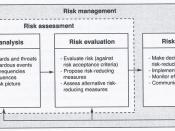Running head: TEXTBOOK ASSIGNMENT 1 TEXTBOOK ASSIGNMENT � PAGE \* Arabic \* MERGEFORMAT �6�
Textbook Assignment
name
ACC/400: Accounting for Decision Making
May 2010
instructor
�
Textbook Assignment
Chapter 8 of Financial Accounting: Tools for Business Decision Making by Kimmel, Weygandt, and Kieso (2007) is Reporting and Analyzing Receivables. Receivables are "amounts due from individuals and companies that are expected to be collected in cash" (Kimmel, Weygandt, & Kieso, 2007, p. 396). Chapter 9 of Financial and Managerial Accounting: The Basis for Business Decisions by Williams, Haka, and Bettner (2005) is Plant and Intangible Assets. Plant assets are "long-lived assets that are acquired for use in business operations rather than for resale to customers" (Williams, Haka, & Bettner, 2005, p. 395) and intangible assets are "those assets that are used in the operation of a business but that have no physical substance and are noncurrent" (Williams, Haka, & Bettner, 2005, p.
395). In this paper, I will provide a question and answer format for Questions 3 and 4, and Exercise E8-5 from chapter 8, and Exercise E9-9 from chapter 9.
Question 3
3. What are the essential features of the allowance method of accounting for bad debts?
The allowance method of accounting for bad debts has three essential features (Kimmel, Weygandt, & Kieso, 2007):
Estimated uncollectible accounts receivables are matched against revenues in the same accounting period that the revenues are recorded.
Estimated uncollectibles are recorded as a debit (an increase) to Bad Debts Expense and as a credit (an increase) to Allowance for Doubtful Accounts (a contra asset account) by an adjusting entry at the end of each period.
Actual uncollectibles are debited to Allowance for Doubtful Accounts and credited to Accounts Receivable at the time the specific account is written off as uncollectible.
Question 4
4. Lauren Anderson...


